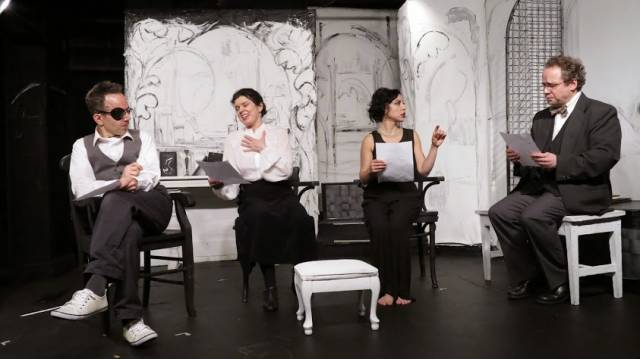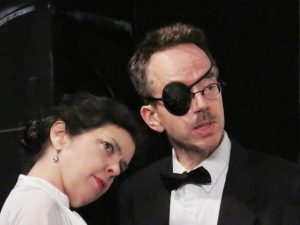

Samuel Beckett, perhaps the twentieth century's greatest playwright, met his idol James Joyce in Paris during the late 1920s. The young writer actually assisted Joyce in the completion of his final work Finnegan’s Wake. What ideas passed in intimate conversation between these two masters of English (among other languages) can only be imagined. However, this is exactly what has been imagined by playwright David Willinger, who has depicted the complex relationship between the two iconic writers in his new play Out of Their Minds, produced by New Media Repertory.
What is known about the friendship, collaboration and conflicts between these two mighty geniuses is quite interesting. The story is made even more dramatic by the fact that Joyce’s daughter, the troubled dancer Lucia Joyce, apparently fell in love with the young Beckett only to be rejected due to her schizophrenia (she was later treated by none other than Carl Jung). This is all fascinating material for a playwright. Unfortunately it somehow manages to fall rather flat in Out of Their Minds.
Beckett and Joyce were both giants; they were artists who dispensed with cliché. This is not the case with Out of Their Minds, which uses, among other stereotypical devices, prerecorded sounds of marching boots to depict the Nazi invasion of Paris. Then there is the all-too-familiar scene of the two great men coming in drunk one night, singing wittily after an evening of Parisian debauchery. But most egregious is the use of an unfortunate device, the “Aha!” moment that depicts how iconic works were “really” created (or borrowed). In this case it is a scene in which James, Nora and Lucia act out their own peculiar vaudeville routine that happens to be a remarkably prescient adumbration of Beckett’s play Waiting for Godot. James and Lucia enter in bowler hats and wait. Nora appears with a whip and forces James to his knees while commanding, “Speak, beast!” Beckett, perched in the corner, watches all of this while sneakily scribbling into a notebook. There are also references to future Beckett works thrown about as dialogue. “An endgame!” cries Beckett, in response to a characterization of his writing. This was tiresome even when Woody Allen and Diane Keaton performed essentially the same gag with famed Russian works in Love and Death.
There are a few moments that manage to work. There is a funny and somewhat touching scene depicting Joyce and his family reading aloud from Beckett’s play about Samuel Johnson, Early Wishes. The satire of Beckett’s writing style is subtler here, and it is also brief. Most of the time the characters simply move about the stage, beating their gums with biographical information about Joyce while giving lip service to conflicts between him and members of his family. Nora complains about Joyce’s abstruse writing style and his drinking. She surely did this in real life, but to see it enacted onstage, complete with on-the-nose dialogue is, unfortunately, not very interesting. Lucia’s behavior problems, which must have been harrowing to James and Nora in real life, are melodramatic and unmoving. And the play seems to blame Beckett, at least in part, for causing them.

Despite the limitations of the script, Tony Greanleaf manages to appear rather convincing as James Joyce. He is mysterious, often silent and still. He frequently delivers his lines to the other characters without looking at them, instead gazing off somewhere while speaking, half lost in his own thoughts. Whether this is due to Joyce’s failing eyesight or the author’s unusual psychological makeup is not clear, which is what makes it an interesting choice.
Greg Horton is a fine actor, but he is miscast as the young Beckett. He is expressive, sympathetic and interesting to watch. But he does not appear to be the mysterious genius-in-the-making of the play. Beckett, in photographs and interviews, looks like a hawk as he coldly observes life’s cruelties without being expressive himself. Horton is reminiscent of a young Paul Giamatti, a highly emotive everyman.
The set is rather bland; white panels with some black scribbling on them form the walls of the Joyce home in Paris where the entire play takes place. For some reason the same canned passage from Ravel’s La Valse is played during every single scene change (there are a lot of them) and this quickly becomes tiresome. The play did arouse my interest in the relationship between Joyce and Beckett, which is to its credit. But as a drama, Out of Their Minds seems like a missed opportunity.
Out of Their Minds plays through November 16 at New Media Rep. For more information and tickets visit https://newmediarep.org
Through November 16 at New Media Rep.